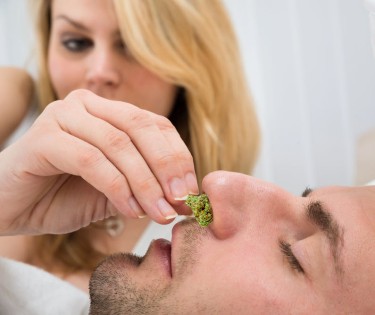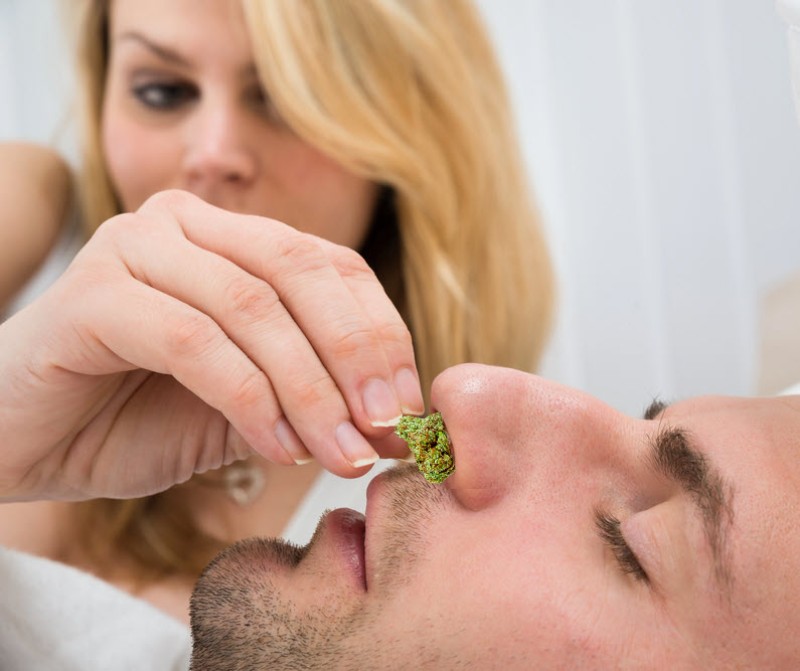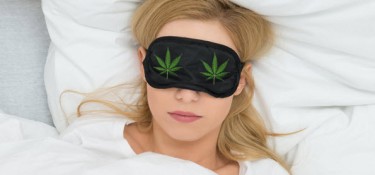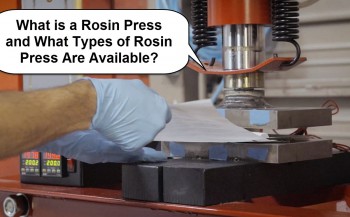
Sleep apnea, a condition that affects millions of people worldwide, has long been a nighttime nemesis. Characterized by interrupted breathing during sleep, this disorder not only disturbs rest but is linked to serious health issues like heart disease, stroke, and chronic fatigue. While Continuous Positive Airway Pressure (CPAP) machines and lifestyle changes remain standard treatments, a surprising new contender has entered the sleep health arena: cannabis.
A recent survey conducted by the National Sleep Foundation in collaboration with independent researchers has shed new light on an unconventional remedy — cannabis use. The results are generating buzz: a significant number of sleep apnea sufferers report improved sleep quality, reduced snoring, and fewer apnea episodes after using cannabis-based products and certain cannabis strains for sleep apnea.
So, could getting stoned really help you snore less?
Cannabis and Sleep: A Growing Connection
The idea that cannabis can help with sleep isn't new. Anecdotal evidence and early research have long suggested that certain compounds in cannabis — particularly cannabinoids like THC (tetrahydrocannabinol) and CBD (cannabidiol) — can influence sleep patterns. THC is known for its sedative effects, while CBD may reduce anxiety, another common contributor to poor sleep.
However, what's new — and exciting — is the specific focus on obstructive sleep apnea (OSA) and cannabis, the most common form of sleep apnea. This disorder causes the throat muscles to relax intermittently during sleep, blocking the airway and leading to pauses in breathing. Sufferers often snore loudly, gasp for air, and feel exhausted during the day despite spending enough time in bed.
Until now, the idea that cannabis could help with a mechanically-driven disorder like sleep apnea has been met with skepticism. But the latest survey is changing minds.
The Survey: What the Numbers Say
The survey, conducted over six months and involving more than 3,000 self-identified sleep apnea patients across the U.S., asked participants about their cannabis usage, sleep quality, and apnea symptoms. Here's what stood out:
61% of cannabis users reported improved sleep quality compared to 34% of non-users.
41% reported a reduction in snoring frequency and intensity after consistent cannabis use.
Among those using cannabis-based products specifically before bedtime, over 30% noticed fewer apnea episodes, as measured by wearable sleep monitors or partner observation.
Interestingly, THC-dominant products showed greater efficacy for apnea-related symptoms than CBD-only products.
These results suggest a meaningful correlation between cannabis consumption and symptom relief, prompting researchers to call for more controlled clinical trials.
How Could Cannabis Help with Sleep Apnea?
While the exact mechanisms remain under study, several hypotheses are emerging:
1. Muscle Relaxation and Airway Stability
Some researchers believe that cannabinoids might help modulate muscle tone in the upper airway, reducing the collapsibility of the throat during sleep. This would directly address the root cause of obstructive sleep apnea.
2. Deeper, More Restorative Sleep
Cannabis, especially THC, has been shown to increase slow-wave sleep (deep sleep), which is the most restorative phase. This can help individuals feel more rested even if their apnea episodes persist.
3. Reduction of Arousal Threshold
THC may raise the threshold at which the brain arouses from sleep due to breathing interruptions. While this might sound counterintuitive, it can prevent the repeated micro-awakenings that make sleep apnea so exhausting.
4. Anti-Inflammatory Effects
Both THC and CBD have anti-inflammatory properties, which may help reduce inflammation in the airways and improve airflow during sleep.
Not a Silver Bullet
Despite these promising findings, cannabis is not a one-size-fits-all solution. The survey participants were self-selected, and self-reporting can lead to biased results. Moreover, cannabis affects individuals differently depending on their tolerance, dosage, strain, and method of consumption (smoking, vaping, edibles, tinctures, etc.).
Dr. Emily Carter, a sleep medicine specialist at UCLA, cautions against replacing proven therapies like CPAP with cannabis without consulting a physician. “The data is encouraging, but we need randomized clinical trials to understand dosage, safety, and long-term effects,” she explains. “Cannabis might be a useful adjunct, but it’s not yet a replacement.”
There are also potential downsides. Chronic cannabis use can lead to dependence, cognitive impairment, and reduced REM sleep, a crucial stage for memory and mood regulation. Additionally, smoking cannabis can irritate the respiratory system — a serious consideration for individuals already dealing with breathing difficulties.
The Legal Landscape
Another complication is the patchwork legality of cannabis across states and countries. While medical marijuana is legal in over 30 U.S. states, and recreational use is allowed in several, it remains illegal under federal law. This creates a legal gray area for patients seeking cannabis for sleep apnea.
Some survey respondents admitted to hesitating about discussing cannabis use with their doctors, fearing judgment or legal repercussions. This highlights the need for more open dialogue between patients and healthcare providers — and for clearer guidelines from regulatory bodies.
What's Next?
The survey has prompted interest from sleep researchers and cannabis scientists alike. Several research institutions, including Stanford and Johns Hopkins, are reportedly planning controlled studies to explore how cannabinoids can be optimized for sleep apnea therapy.
Pharmaceutical companies are also watching closely. Synthetic cannabinoids like dronabinol have already been tested in small trials, showing mild improvements in apnea symptoms. These trials could pave the way for FDA-approved cannabinoid-based treatments tailored specifically for sleep disorders.
In the meantime, sleep apnea patients intrigued by cannabis should proceed with caution and under medical supervision. Products should be sourced from reputable dispensaries, with a focus on controlled dosing and clear labeling.
Conclusion: A New Era for Sleep Apnea Management?
The survey’s message is clear: for some, cannabis may offer a welcome respite from the restless nights and relentless snoring caused by sleep apnea. While it’s far from a definitive cure, it may become a valuable part of a broader sleep health strategy.
As research continues, the idea of treating sleep disorders with cannabis may become less fringe and more mainstream. For now, the best approach is an informed one — guided by science, medical advice, and personal experience.
So yes, getting stoned might just help you snore less. But like all things in medicine, it’s best done thoughtfully, and preferably under the guidance of a professional who knows your full health picture.






